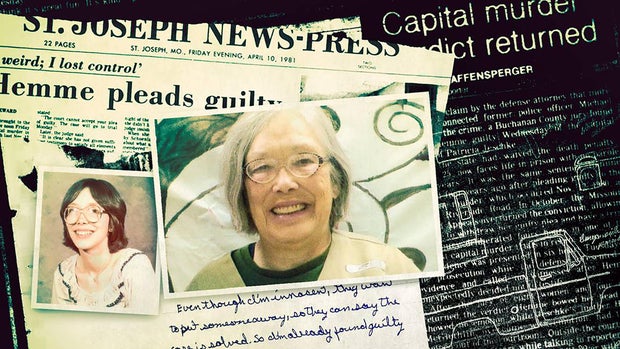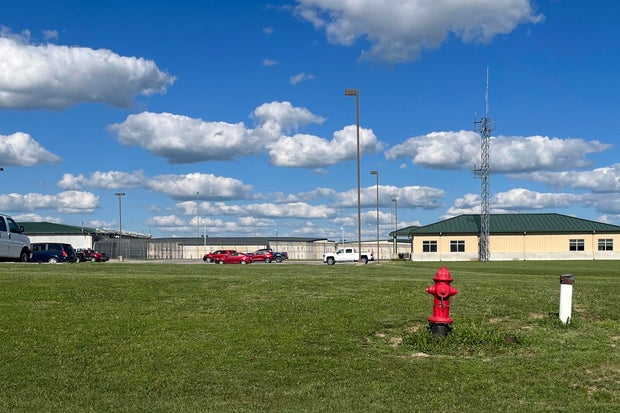CBS News
Missouri woman who spent 43 years in prison is free after her murder conviction was overturned

A woman whose murder conviction was overturned after she served 43 years of a life sentence was released Friday, despite attempts in the last month by Missouri’s attorney general to keep her behind bars.
Sandra Hemme, 64, left a prison in Chillicothe, hours after a judge threatened to hold the attorney general’s office in contempt if they continued to fight against her release. She reunited with her family at a nearby park, where she hugged her sister, daughter and granddaughter.
“You were just a baby when your mom sent me a picture of you,” she said. “You looked just like your mamma when you were little and you still look like her.”
Her granddaughter laughed. “I get that a lot.”
Hemme had been the longest-held wrongly incarcerated woman known in the U.S., according to her legal team at the Innocence Project. The judge originally ruled on June 14 that Hemme’s attorneys had established “clear and convincing evidence” of “actual innocence” and he overturned her conviction. But Republican Attorney General Andrew Bailey fought her release in the courts.
Neil Nakahodo/The Kansas City Star/Tribune News Service via Getty Images
“It was too easy to convict an innocent person and way harder than it should have been to get her out, even to the point of court orders being ignored,” her attorney Sean O’Brien said. “It shouldn’t be this hard to free an innocent person.”
During a court hearing Friday, Judge Ryan Horsman said that if Hemme wasn’t released within hours, Bailey himself would have to appear in court Tuesday morning. He threatened to hold the attorney general’s office in contempt.
He also scolded Bailey’s office for calling the warden and telling prison officials not to release Hemme after he ordered her to be freed in her own recognizance. “I would suggest you never do that,” Horsman said, adding: “To call someone and tell them to disregard a court order is wrong.”
Hemme declined to address reporters after she was released. O’Brien said she was going straight to the side of her father, who was hospitalized with kidney failure and recently moved to palliative care. “This has been a long time coming,” he said of her release.
O’Brien said previously that delays had caused their family “irreparable harm and emotional distress.”
There are still struggles ahead.
“She’s going to need help,” he said, noting she won’t be eligible for Social Security because she has been incarcerated for so long.
Heather Hollingsworth / AP
A situation lawyers have “never seen”
Over the last month, a circuit judge, an appellate court and the Missouri Supreme Court all agreed Hemme should be released, but she was still held behind bars, leaving her lawyers and legal experts puzzled.
“I’ve never seen it,” said Michael Wolff, a former Missouri Supreme Court judge and professor and dean emeritus of Saint Louis University Law School. “Once the courts have spoken, the courts should be obeyed.”
The lone holdup to freedom came from the attorney general, who filed court motions seeking to force her to serve additional years for decades-old prison assault cases. The warden at the Chillicothe Correctional Center initially declined to let Hemme go, based on Bailey’s actions.
Horsman ruled on June 14 that “the totality of the evidence supports a finding of actual innocence.” A state appeals court ruled on July 8 that Hemme should be set free while it continued to review the case. The next day, July 9, Horsman ruled Hemme should be released to go home with her sister. The Missouri Supreme Court on Thursday declined to undo the lower court rulings that allowed her to be released on her own recognizance and placed with her sister and brother-in-law.
Bailey, a Republican facing opposition in the Aug. 6 primary election, responded with another request late Thursday, asking the Circuit Court to reconsider.
Hemme was serving a life sentence at the Chillicothe Correctional Center for the 1980 stabbing death of library worker Patricia Jeschke in St. Joseph, Missouri.
Hemme’s immediate freedom was complicated by sentences she received for crimes committed while behind bars. She received a 10-year sentence in 1996 for attacking a prison worker with a razor blade, and a two-year sentence in 1984 for “offering to commit violence.” Bailey had argued that Hemme represents a safety risk to herself and others and that she should start serving those sentences now.
Her attorneys countered that keeping her incarcerated any longer would be a “draconian outcome.”
Some legal experts agreed.
Peter Joy, a law professor at the Washington University School of Law in St. Louis, said the effort to keep Hemme in prison was “a shock to the conscience of any decent human being,” since evidence strongly suggests she didn’t commit the crime.
Bailey’s office did not immediately respond to messages seeking comment Friday.
Bailey, who was appointed attorney general after Eric Schmitt was elected to the U.S. Senate in 2022, has a history of opposing overturning convictions, even when local prosecutors cite evidence of actual innocence.
Horsman, after an extensive review, concluded in June that Hemme was heavily sedated and in a “malleable mental state” when investigators repeatedly questioned her in a psychiatric hospital after the killing. Her attorneys described her ultimate confession as “often monosyllabic responses to leading questions.”
CBS News previously reported that the attorneys called her statements “wildly contradictory” and “factually impossible.”
Innocence Project
She initially didn’t mention a murder, then claimed Jeschke was killed by a man who police later determined was in Topeka at the time, and then later said she knew about the murder because of “extrasensory perception,” according to her attorneys.
The Innocence Project accused police of manipulating Hemme into giving the confession.
“Police exploited her mental illness and coerced her into making false statements while she was sedated and being treated with antipsychotic medication,” the Innocence Project said in an online petition, according to previous CBS News reporting. “The only evidence that ever connected Ms. Hemme to the crime was her own unreliable and false confessions: statements taken from her while she was being treated at the state psychiatric hospital and forcibly given medication literally designed to overpower her will.”
Other than the confession, no evidence linked her to the crime, her trial prosecutor said.
The St. Joseph Police Department, meanwhile, ignored evidence pointing to Michael Holman — a fellow officer, who died in 2015 — and the prosecution wasn’t told about FBI results that could have cleared Hemme, so it was never disclosed before her trials, the judge found.
Evidence presented to Horsman showed that Holman’s pickup truck was seen outside Jeschke’s apartment, that he tried to use her credit card, and that her earrings were found in his home. His alibi also could not be corroborated, CBS News reported.
Horsman, in his report, called Hemme “the victim of a manifest injustice.”
CBS News
Some in North Carolina still waiting on disaster aid after Hurricane Helene

Watch CBS News
Be the first to know
Get browser notifications for breaking news, live events, and exclusive reporting.
CBS News
More than a century after their land was ravaged by the California gold rush, Yurok tribe to reclaim land near Redwood National and State Parks

Rosie Clayburn is a descendant of the Yurok Tribe, which had its territory — called ‘O Rew in the Yurok language — ripped from them nearly two centuries ago.
“As the natural world became completely decimated, so did the Yurok people,” she said.
That decimation started when miners rushed in for gold, killing and displacing tens of thousands of Native Americans in California and ravaging the redwood trees for lumber.
“Everything was extracted that was marketable,” Clayburn said. “We’ve always had this really intricate relationship with the landscape. We’ve hunted, we’ve fished, we’ve gathered. And those are all management tools. Everything that we do has been in balance with the natural world.”
Now, generations later, 125 acres bordering Redwood National and State Parks will be handed back to the Yuroks.
The nonprofit Save the Redwoods League purchased the land in 2013 from an old timber mill, with the original goal of giving it to the National Park Service.
“As we continued conversations about the transfer of this land to the National Park Service, we began to realize that perhaps a better alternative would be to transfer the land back to the Yurok Tribe,” said Save the Redwoods League’s Paul Ringgold. “No one knows this land better. They’ve been stewarding this land since time and memorial”
Ringgold said that stewardship includes controlled burns to clear dead vegetation — a native practice once outlawed, but now recognized as essential in preventing catastrophic wildfires.
“Indigenous populations have been using fire as a management tool,” he said. “We’d like to see that kind of practice return.”
Redwoods serve as some of the largest stores of carbon on the planet. A single tree can capture up to 250 tons in its lifetime, the equivalent of removing nearly 200 cars from the road for an entire year.
But between logging and fires, 95% of California’s redwoods have been destroyed. Over the past decade, the Yurok have been helping restore the land.
Another forgotten jewel of the ecosystem is salmon. The fish were once so plentiful, they were eaten with most meals. The Yurok word for salmon even translates to “that which we eat.” But the salmon population has dwindled to about one-quarter of what it was 20 years ago, according to a coalition of state and federal agencies.
The tribe is working to bolster the fish’s population by building a stream channel, two connected ponds and about 20 acres of floodplain.
“You have salmon who provide for humans, but they also provide for other animals,” Clayburn said. “And then when they spawn and die, they put nutrients back in the ground. And so, everything just has this, this balance and this reciprocal way.”
That balance is returning. There’s been a rebound in the salmon population and the Yuroks also recently reintroduced the California condor — a scavenger that’s important to the ecosystem — back into the wild for the first time this century.
“It tells us that our land’s healing and that our people are gonna heal,” Clayburn said.
The Yuroks will take full control of ‘O Rew in 2026 and, in a first-of-its-kind partnership, receive help managing it from the Save the Redwoods League, California State Parks and The National Park Service.
“We understand some of the mistakes we made as a federal government, and it’s a chance to begin that healing with the native tribes all across the United States,” said National Park Service Director Chuck Sams.
For Sams, the first Native American to lead the agency, the partnership is personal.
“We’ve been writing our histories separately. There’s been the native history and then the American history. This is a chance when we’re doing co-stewardship and co-management to write history together,” he said.
Of the 431 parks managed by the National Park Service, 109 of them now have formal co-stewardship agreements with indigenous tribes, with 43 more on the way.
In addition to restoration work, plans for ‘O Rew include the creation of new trails, the construction of a traditional Yurok village and a state-of-the-art visitor center. The visitor center will display Yurok artifacts and highlight the tribe’s history and culture, with the goal of educating new visitors on the land’s history and significance from the perspective of those who have lived on it the longest.
“I really hope ‘O Rew symbolizes a coming home of the Yurok people and reconnecting with our landscape,” said Clayburn.
CBS News
“CBS Evening News” headlines for Monday, Dec. 16, 2024

Watch CBS News
Be the first to know
Get browser notifications for breaking news, live events, and exclusive reporting.












